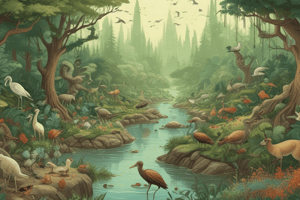Podcast
Questions and Answers
What is the primary consequence of interspecific competition?
What is the primary consequence of interspecific competition?
- Exclusion of one species from a resource
- Shift in community structure (correct)
- Resource partitioning and diverse traits
- Reduction in growth rates and reproductive success
How does predation influence population dynamics?
How does predation influence population dynamics?
- Regulates prey populations (correct)
- Leads to resource partitioning
- Results in diverse morphological traits
- Reduces reproductive success
What type of species interaction results in a transfer of energy from prey to predator?
What type of species interaction results in a transfer of energy from prey to predator?
- Competition
- Mutualism
- Parasitism
- Predation (correct)
What is an outcome of mutualism?
What is an outcome of mutualism?
What is the role of a pollinator like a bee in the relationship with a plant?
What is the role of a pollinator like a bee in the relationship with a plant?
In the relationship between certain fish and their cleaner hosts, what benefit does the cleaner fish provide to the host?
In the relationship between certain fish and their cleaner hosts, what benefit does the cleaner fish provide to the host?
What is the defining characteristic of parasitism as a species interaction?
What is the defining characteristic of parasitism as a species interaction?
How can parasites influence the evolution of host behaviors and morphologies?
How can parasites influence the evolution of host behaviors and morphologies?
What is carrying capacity in ecological terms influenced by?
What is carrying capacity in ecological terms influenced by?
How can human activities affect carrying capacity in ecological systems?
How can human activities affect carrying capacity in ecological systems?
Study Notes
Species Interaction and Population Ecology
Species interactions play a crucial role in shaping population dynamics and community structure in ecological systems. These interactions can be categorized as competition, predation, mutualism, parasitism, and carrying capacity.
Competition
Competition occurs when two or more species seek the same limited resources, such as food, water, and space (Wilson and Bossert, 1974). This can lead to a reduction in the growth rates, survival, and reproductive success of the competing species. Competition can be divided into two main types: intraspecific (within species) and interspecific (between species) (Darwin, 1859). Intraspecific competition can lead to resource partitioning and the evolution of diverse morphological and behavioral traits. In contrast, interspecific competition can result in the exclusion of one species from a resource, leading to a shift in community structure.
Predation
Predation is the act of one species killing and consuming another, resulting in a transfer of energy from the prey to the predator (Ehrlich and Ehrlich, 1974). Predation can have significant effects on population dynamics, as it can regulate prey populations and shape their distribution and behavior. Predators can also influence the evolution of anti-predator adaptations in prey species.
Mutualism
Mutualism is a type of species interaction in which both species benefit from the interaction. This can include pollination, where a pollinator (e.g., a bee) transfers pollen between the flowers of a plant, resulting in the production of seeds and fruit for the plant and nectar for the pollinator. Another example is the relationship between certain fish and their cleaner hosts, where the cleaner fish remove ectoparasites and dead skin from the host, improving the host's health and fitness.
Parasitism
Parasitism is a type of species interaction in which one species (the parasite) benefits at the expense of another species (the host). Parasites can have various effects on their hosts, ranging from minor to severe. They can cause direct harm through the consumption of host resources, transmission of diseases, or destruction of host tissues. Parasites can also influence the evolution of host behaviors and morphologies, such as the development of resistance mechanisms or changes in host distribution.
Carrying Capacity
Carrying capacity is the maximum number of individuals of a species that can be sustained by a given environment without causing significant degradation or depletion of the resources (Malthus, 1798). It is influenced by various factors, such as the availability of resources, the presence of limiting factors (e.g., competition, predation), and the effects of natural disturbances. Carrying capacity can also be affected by human activities, such as habitat destruction and overexploitation of resources.
In conclusion, species interactions play a significant role in shaping population dynamics and community structure in ecological systems. By understanding these interactions, we can better predict and manage the impacts of human activities on natural ecosystems.
Studying That Suits You
Use AI to generate personalized quizzes and flashcards to suit your learning preferences.
Description
Test your knowledge of species interactions and population ecology with this quiz. Explore concepts such as competition, predation, mutualism, parasitism, and carrying capacity, and their impact on population dynamics and community structure in ecological systems.




